
Earplugs can be practical if you’re exposed to loud noises, such as for example, something as simple as a snoring spouse, or a lawnmower in your backyard, or going to a concert at an arena. Decreasing the sound level is how earplugs help in the first two circumstances. In the last case, they bring down the sound levels plus help protect your sanity (and possibly your marriage) by enabling you to get a good night’s sleep. But is your hearing being damaged by these protectors?
Why Use Earplugs in The First Place?
The case for earplugs is pretty simple: When used properly, earplugs can help protect your ears by reducing your direct exposure to excessive decibel levels. When you leave a loud place, like a football game where the announcer keeps exhorting the crowd to, GET LOUD, every time the opposing team kicks off, you’ve most likely noticed that your hearing seems different, and you may also experience symptoms of tinnitus. This happens because those super-loud noises can actually bend the tiny hair cells in your inner ear. In a couple of days, when the hairs have recovered, it usually goes back to normal.
But if you’re subjected to extreme decibels regularly, say you work on a construction crew or at an airport, the aural assault on those tiny hair cells is unyielding. Rather than bending and then recovering, the cells are permanently injured. You’ve got about 16,000 of those little cells inside each cochlea, but up to 50% of them can be harmed or ruined before your hearing has altered enough for the problem to appear in a hearing test.
Is it Possible That Your Ears Could be Injured by Earplugs?
That being said, you’d think that wearing earplugs would be a no-brainer in terms of protecting your ears. But if your exposed to loud noises on a regular basis, this seems to be even more obvious (like on the job or when your significant other snores as previously stated), over-the-head earmuffs or noise-reducing (but not completely stopping) headphones are a smarter choice. Earplugs aren’t the best choice for day to day use but are a smarter choice for one time occasions such as a concert or sporting events.
Why? The first problem is, earwax. In order to protect themselves, your ears produce earwax, and if using earplugs is something you do regularly, they’re going to make more of it, and the earplugs will jam it in further. This can lead to problems such as impacted earwax, which can trigger tinnitus and other hearing problems.
An ear infection can be another complication for people who wear earplugs. They can become bacteria traps if you use the same pair without proper cleaning and disinfecting. Ear infections are, at the very least, an uncomfortable irritation. But at the negative end of the scale, they can also cause a loss of hearing if neglected.
How Can You Use Earplugs Without Risk?
Earplugs nevertheless have a strong upside, whether it’s protecting your hearing or getting a restful night’s sleep. You just need to be certain you’re using the proper kind and utilizing them in the proper way. Foam earplugs are the least costly, which is helpful because you really should not use them more than once, the soft, porous material is a germ’s paradise. Don’t put wax or silicone earplugs back in your ears until they are totally dry after using warm water to entirely clean them. Accumulation of dampness can cause bacteria or mold so store your earplugs in a well ventilated container.
You may want to talk to us concerning custom fit earplugs if you need or want them on a regular basis. They’re comfortable since they’re crafted from molds of your ears and they are reusable. Again though, to protect against any potential hearing damage, it’s essential to practice smart earplug hygiene!